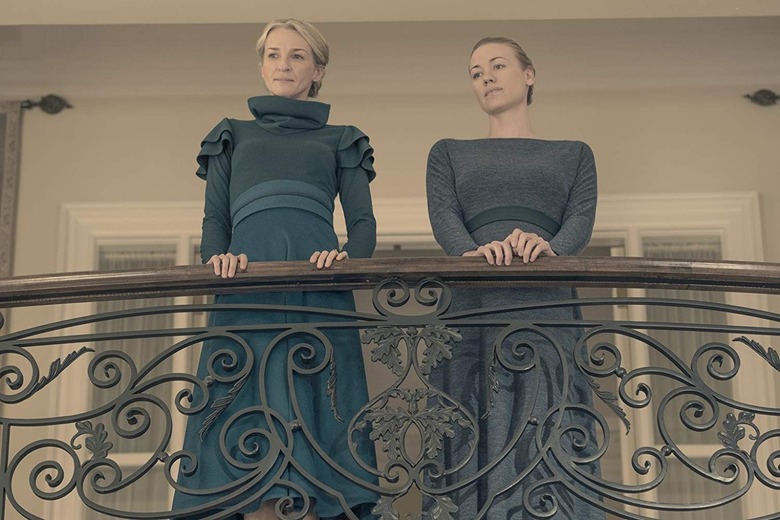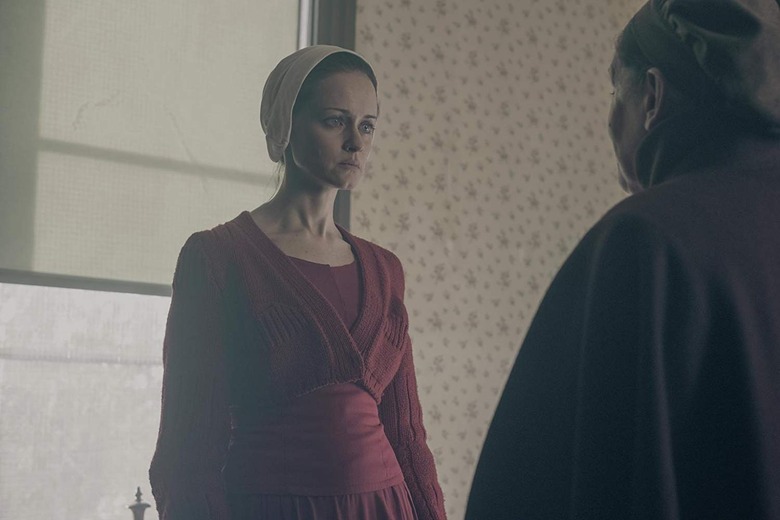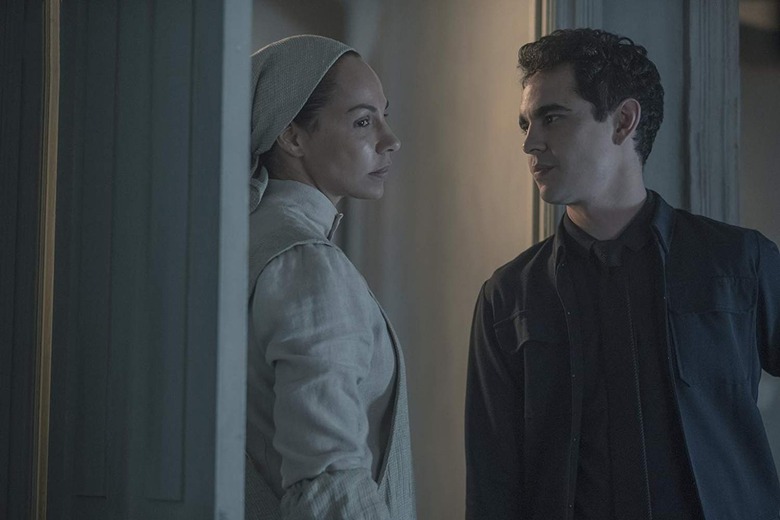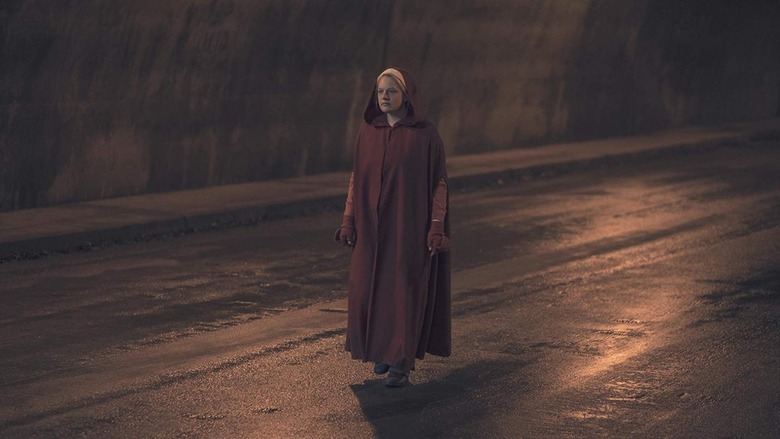'The Handmaid's Tale' Tries To Wrap Up An Uneven Season 2 With An Ill-Fitting Bow
(We're going to kickstart our weekly The Handmaid's Tale review by answering one simple question: Who suffered the most?)
In the spirit of The Handmaid's Tale's spectacularly on-the-nose needledrops, I would like to compare the season 2 finale of the Hulu series, "The Word," to John Mayer's hit song "Daughters." "Fathers be good to your daughters / daughters will love like you do / Girls become lovers who turn into mothers / so mothers be good to your daughters too," Mayer croons in the sentimental pop song that tries so hard to relate to women through their standing as mothers, daughters, sisters.
The Handmaid's Tale has had a complex relationship with motherhood. Its premise is centered around women who have had their identity and agency stripped from them — reduced to merely child-bearing vessels. Neither mother, nor daughter, nor sister. And yet, like Mayer's simplistic understanding of gender norms, The Handmaid's Tale has had trouble expanding its characterization of women beyond mother.
This season has been all about the importance of motherhood. June's desperation to be reunited with Hannah, then when she gives birth to Holly, her desperation to save her from her fate of living under Gilead's oppressive rule. All the while the shadow of June's own mother looms overhead, her radical feminist teachings beginning to impact June's bolder behavior against her oppressors. It's through the lens of motherhood that we're given more of Emily's backstory — her cruel separation from her partner and child. Janine and her unabating dedication to her child define most of her arc. Moira's brush with motherhood when she, in flashback, acts as a surrogate, informs so much of who she is as a person — and casts her as perhaps the lone exception to this sweeping motherhood theme.
And it's through motherhood that we're finally able to sympathize with Serena, who has swung from cold, jealous mistress to unlikely ally all throughout the season. Then there's Eden: the perennial "daughter." Though introduced as the child bride of Nick and a potential wrench in Nick and June's illicit affair, it soon becomes clear that Eden's purpose is not to be the villain but the victim. Her execution last episode becomes the catalyst for Serena's most sympathetic arc yet, and somewhat messily ties together the season's disjointed threads of mothers and daughters.
Who Suffered the Most? Serena
Season 2 has been an interesting trial for Serena Joy. Where her cruelty toward June was never quite explained in the first seasons except for perhaps a few suggestions toward vague jealousy, season 2 ties Serena inextricably toward her need to be a mother. It's the root of her abuse against June, it's the reason that she "sacrificed everything" to help Fred create Gilead, and it's what ultimately softens us toward her character in the final moments of the season finale. All of the season's previous attempts to make us sympathize with Serena have been tainted by the knowledge that she was at least complicit in Gilead's rise. Her obvious kindness and love toward Holly/Nicole don't make us forget all her previous wrongdoings of course (people are allowed to be complicated), but it comes close to doing so. That's no knock on Yvonne Strahovski's performance, who gives a searing, career-best turn as Serena in her many forms, nor is it really a knock on the writers who have to justify the time we spend with these "evil" characters with a little complexity. It's perhaps the entire season's movement from beyond adapting the parable of Margaret Atwood's 1985 novel and into real character-building territory.
I just don't want a rewrite of Serena's character. When she raged against Fred two episodes back about the "sacrifices" she made for him so she could have a child, I don't want us to forget that she helped orchestrate Gilead's rise presumably because she truly believed in its cause. And when she tearfully hands Nicole to June to smuggle her out of Gilead, I don't want us to forget that it was Serena who helped Fred rape June to induce her into labor.
But maybe I'm being too cynical over how this show handles its characters — if anything, Serena's arc was The Handmaid's Tale's greatest triumph. It managed to poise her as both the foil and unlikely ally to June, united by — that's right — their natural motherly instincts. It's perhaps a simple solution to bring the women of Gilead together, but as we saw hints of in the episode "Women's Work," it's effective. It's Serena's fear for her daughter's life after witnessing Eden's execution that galvanizes her to rally the Wives to propose an amendment to the Council: the allow both young boys and girls to read. But when the Council snickers and is generally dismissive of their proposal, Serena takes it a step too far: reading a passage from Eden's secret Bible aloud in front of the most powerful men in the country. It's her second act of rebellion in the season, and perhaps her most genuine one — where before we saw remnants of the old power-hungry Serena when she began issuing commands in Fred's place, here she does it out of emotion. And it's the emotional act of rebellion that earns Serena her worst punishment yet, with Fred arresting her and cutting off her finger. But as we move on to season 3, I hope we'll see both sides of Serena — the power-hungry Serena and the maternal Serena — finally cohere into one complex, complicated woman.
Walking on Broken Glass
Let's pour one out for Emily, the great underutilized character of season 2. Alexis Bledel shone in her early standalone episode that delved into her past, giving me hope that the season would focus similarly on all the other characters of the series (no such luck). But then I realized that Emily would mostly spend the majority of the season growing steadily more bitter and enraged until she finally lashes out against Aunt Lydia and takes her revenge. Now this would be a fascinating arc for Emily — if it didn't take place on the periphery of the season and only move in the last two episodes. The sudden Gothic turn for Emily's arc was intriguing, but over too soon, as it seems that Bradley Whitford didn't want to check in for more than a guest appearance. I would have gladly spent a whole season seeing Emily and Commander Lawrence spar verbally (but then again, I'm a sucker for slow-burning Gothic horror), but sadly it ends just as we were beginning to groove to Annie Lennox.
Because it turns out Lawrence, despite the revelation that he conceived of the Colonies, is a pretty good guy! After Emily stabs Aunt Lydia in the back and kicks her down the stairs, Lawrence greets the scene with little more than mild irritation and helps an unwitting Emily escape from Gilead.
For the Children
Perhaps the weakest point in this episode is its recontextualizing of Eden as a martyr. Like I criticized in the last episode, Eden never felt like a fully realized character, so everyone's sudden affection for her feels jarring. "The Word" does some massive legwork to paint Eden as the sacrificial lamb that will unite the women in some maternal harmony, and it just barely works. With the reveal of Eden's Bible, filled with scribbles and doodles written by the young believer, Eden becomes more interesting in death than she ever was in life. "Brave girl," Janine remarks when June tells the handmaids about her discovery of Eden's Bible. Thanks for telling us, The Handmaid's Tale.
Eden's death is a somewhat ill-fitting bow to use to wrap up a complicated season. It re-centers the show on motherhood and makes it seem like a simpler show. It's about the future generation, about saving them from the oppressive rule of Gilead — which is a noble and sincere theme to wrap on, but it feels like it ignores or drops some of the issues that season brushed on, like the Colonies, the Econowives, and the complicit women.
But Eden's father's supplication in front of the Waterfords and the revelation that he turned in his own daughter is certainly a gut punch. It's the catalyst that emboldens June to berate both Serena and Fred — softening Serena's heart and only falling on Fred's deaf (and lust-filled) ears. But at least June finally gets to slap Fred. The one who really sells the loss of Eden though, is Amanda Brugel's Rita, who finally gets to shine after being severely underused for the past two seasons. Rita's guilt over her harsh treatment of Eden is palpable, uttering to June, "She was a child" while they gather up Eden's uniform and belongings. Her shock and guilt over Eden's death is perhaps the one reaction that comes across as truly organic — she was unnecessarily harsh to a girl who did her no wrong. And it leads Rita to step up as June's savior, organizing June and Holly's escape from Gilead with her network of Martha's. I love that Brugel was given the chance to grow as both June's friend and her equal through the past few episodes, and this felt like a cathartic moment for her.
And I haven't given much praise to Elisabeth Moss, have I? She's brilliant as always, but it's in the quiet final moments of the episode that her performance truly sings. As June waits scared at the edge of a literal railroad, she comforts Holly and flashes back to a lullaby she sings to Hannah. It's a lovely moment that leads into her final sacrifice: June gives Emily her baby and tells her to call her Nicole, choosing to stay behind in Gilead. And so begins the revolution. Or does it?




